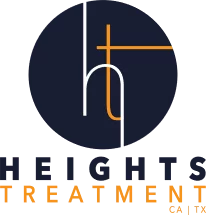Outpatient Treatment For Mental Health and Substance Abuse
Outpatient Programs at the Heights Treatment
What is the Supportive Outpatient Program?
The Heights Treatment outpatient treatment program consists of treatment for substance use and co-occurring disorders. The program includes two meetings per week for one hour of individual therapy and one hour of group or family therapy. With our outpatient programs, clients will learn awareness and coping skills through evidence-based therapeutic sessions.
These sessions are designed to help each individual restore healthy daily patterns and begin to build the present and future they truly desire for themselves.
As an adjunct to supportive outpatient, and true to our California location, clients enrolled in outpatient at The Heights Treatment’s Los Angeles facility will have the option to participate in weekly pickleball, kickboxing, hikes, beach yoga, and rock climbing.

Supportive Outpatient Program at a Glance
Treatment Modality
Duration & Frequency
Conditions Treated
Group or Family therapy
Individual therapy

How (and Why) Supportive Outpatient Works
Supportive Outpatient provides a safe, stable, and structured environment to facilitate the recovery process.
Through evidence-based mental health therapies, peer support, medication management, and family therapy, The Heights Treatment team is adept at addressing numerous substance abuse issues, mood disorders, and mental health conditions.
Efficacy of Supportive Outpatient Programs
In a study of community-based clinics providing intensive outpatient care and regular outpatient care for opioid-dependent African Americans, both groups were more likely to continue treatment, less likely to use substances, and had a higher quality of life.
Also, in a variety of studies reviewed by the NIH, inpatient treatment was found to be effective for patients with alcohol use disorders, alcohol dependence, and substance use disorders. That said, the efficacy of outpatient treatment also depends on the individual’s diagnosis and whether they’ve previously received inpatient treatment. Because there are so many variables, The Heights Treatment team customizes each treatment plan to the individual’s needs.
The Heights Treatment Outpatient Los Angeles Team
Click on the links below to learn about the outpatient program staff in Los Angeles.
What Our Los Angeles Outpatient Alumni Are Saying
Continuum of Care
At The Heights Treatment, we strongly believe that there is no “one-size-fits-all” approach to treatment for mental health issues, substance use disorders, or co-occurring diagnoses.
Every client who undergoes treatment at The Heights Treatment first completes a pre-assessment. Based on this assessment, the Clinical Director and Treatment Team determine the appropriate Level of Care for the client.
Once the appropriate level of care is determined, the care each client receives is individualized based on:
- The results of the client’s multidimensional biopsychosocial assessment based on ASAM Criteria
- The client’s perceived needs
- The determination of the multidisciplinary treatment team
When the client has completed the goals on their treatment plan and/or has stabilized in recovery to such an extent that they can complete the treatment process at a less restrictive level of care, the client will transition to a lower LOC.
ASAM Assessment and the Continuum of Care
The ASAM Criteria is the most widely used and comprehensive set of guidelines for placement, continued stay, transfer, or discharge of patients with addiction and co-occurring conditions.
Using the ASAM Criteria in conjunction with our The Heights Treatment clinical staff’s professional judgment enables us to provide outcome-oriented, results-based care in our addiction treatment.
ASAM outlines various levels of care based on the outcome of the 6 ASAM dimensions assessment. These levels of care are on a scale ranging from 0.5 to 4, with 4 being the most intensive.
At The Heights Treatment, when the client has completed the goals on their outpatient program treatment plan, the client will transition out of treatment.
Continuum of Care at a Glance
Prevention/Early Intervention
Targets individuals at risk to prevent substance abuse through education and early support.
Outpatient
Participants live at home and attend regular treatment sessions, suitable for mild conditions
Intensive Outpatient/Partial Hospitalization
More frequent sessions than outpatient, blending intensive care with community living.
Residential/Inpatient
24/7 care in a live-in facility, offering structured treatment for severe addictions.
Intensive Inpatient
Highly structured, intensive care in a hospital setting for the most severe cases, including medical detox and stabilization.
Frequently Asked Questions about Outpatient Los Angeles
How does the Outpatient Program in Los Angeles support reintegration into everyday life?
The Outpatient Program at The Heights Treatment in Los Angeles is designed to help individuals reintegrate into their daily lives by providing a balance of structured therapy and real-world application. Clients engage in individual and group or family therapy sessions twice a week, focusing on developing awareness, coping skills, and healthy daily routines. The program emphasizes evidence-based therapeutic sessions tailored to support sustained recovery and the building of a fulfilling future.
What unique activities does the Outpatient Program offer to enhance therapy?
Reflecting the dynamic California lifestyle, the Outpatient Program at The Heights Treatment in Los Angeles offers clients the opportunity to participate in unique activities such as pickleball, kickboxing, hikes, beach yoga, and rock climbing. These activities are integrated into the program to complement the therapeutic process, promoting physical wellness, mental health, and social connection, all of which are crucial for holistic recovery.
How does the program address the needs of individuals with co-occurring disorders?
The Outpatient Program is equipped to address the complex needs of individuals with co-occurring disorders through a comprehensive approach that includes evidence-based mental health therapies, peer support, medication management, and family therapy. The program is adept at managing numerous substance abuse issues, mood disorders, and other mental health conditions, providing a stable and structured environment that facilitates the recovery process.


